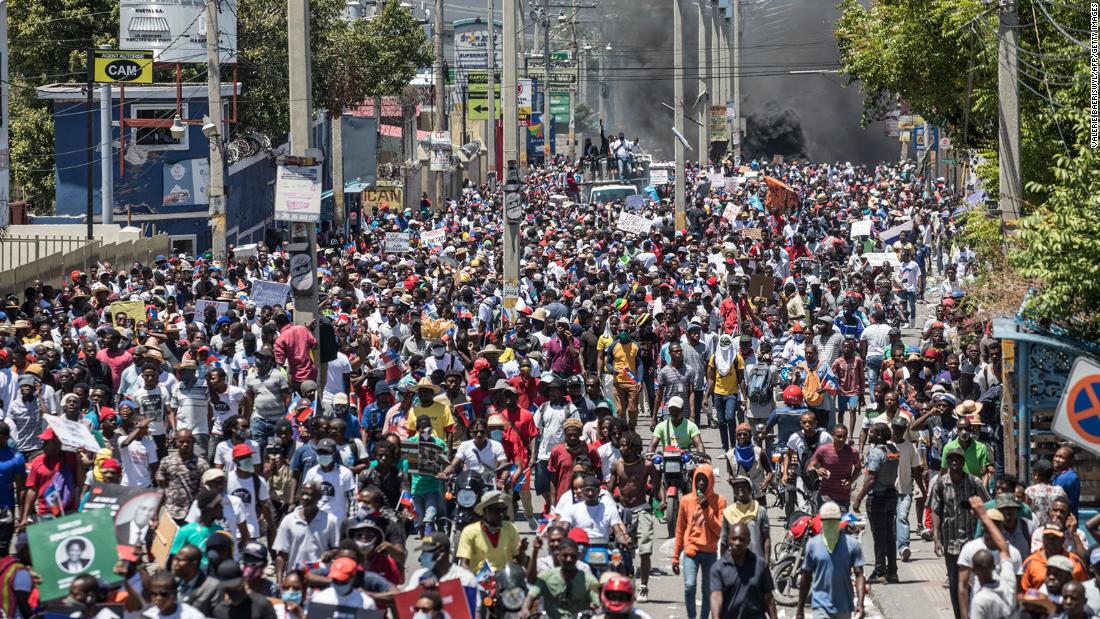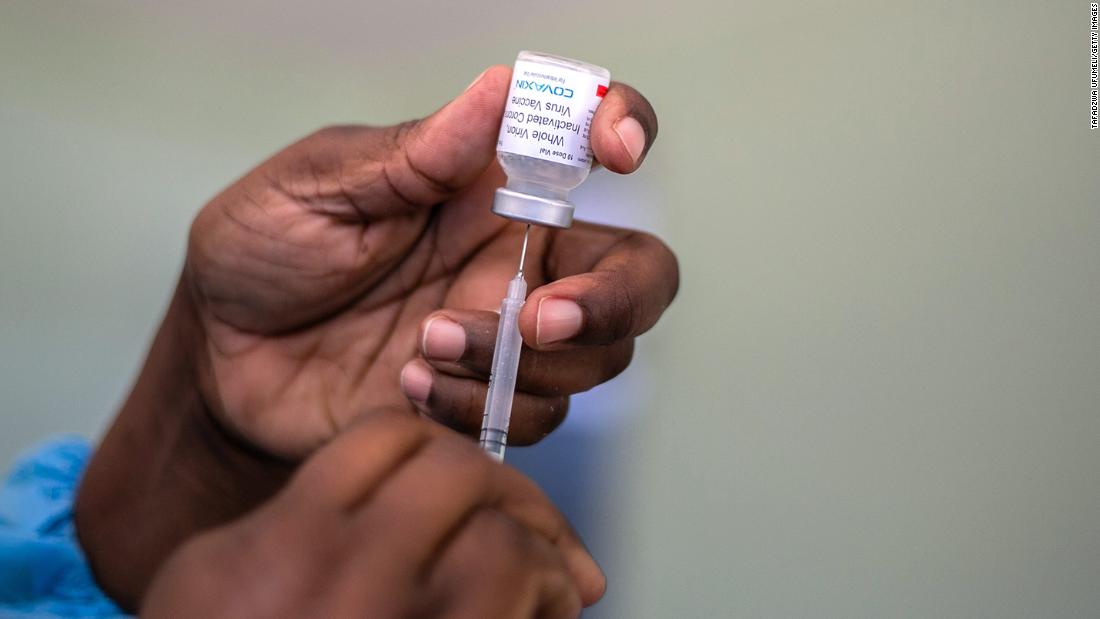The lawsuit came after Republicans blocked ambitious federal legislation this week to protect voting rights.

June 25, 2021Updated 5:35 p.m. ET
WASHINGTON — The Justice Department sued Georgia on Friday over a sweeping voting law passed by the state’s Republican-led legislature, the first significant move by the Biden administration to challenge state-level ballot restrictions enacted since the 2020 election.
“The rights of all eligible citizens to vote are the central pillars of our democracy,” Attorney General Merrick B. Garland said in a news conference at the Justice Department. “They are the rights from which all other rights ultimately flow.”
The complaint accuses the Georgia law of effectively discriminating against Black voters and seeks to show that state lawmakers intended to violate their rights. It says that several of the law’s provisions “were passed with a discriminatory purpose,” Kristen Clarke, the head of the department’s civil rights division, said at the news conference.
The lawsuit, particularly its attempt to prove lawmakers’ intent, is among the most aggressive efforts to expand or preserve voter protections in years. The Supreme Court in 2013 had overturned a key provision of the Voting Rights Act of 1965 that had allowed the Justice Department to stop states from passing laws viewed as facilitating voter discrimination.
It comes days after congressional Republicans blocked the most ambitious federal voting rights legislation in a generation, dealing a blow to Democrats’ efforts to preserve voting rights. President Biden and Democratic leaders pledged to continue working to steer federal voting rights legislation into law and to escalate pressure on states and Republicans, with Mr. Biden planning speeches in key states warning against a threat to the democratic process he has compared to Jim Crow.
The complaint also shows that the Biden administration intends to invoke the remaining tools the Justice Department has to aggressively fight state actions that it sees as potentially disenfranchising minority voters.
Image

“This lawsuit is the first of many steps we are taking to ensure that all eligible voters can cast a vote, that all lawful votes are counted and that every voter has access to accurate information,” Mr. Garland said, calling on Congress to give the department more help.
The Justice Department is also moving to stem increased threats to election officials and poll workers, he said, including creating a task force to investigate and prosecute such cases.
The voting lawsuit, filed in the U.S. District Court for the Northern District of Georgia, will almost certainly take years to resolve, while Republican-led state legislatures continue to seek new voting restrictions.
Republicans in Georgia cast the suit as political. “The D.O.J. lawsuit announced today is legally and constitutionally dead wrong,” Gov. Brian Kemp, a Republican, said on Friday in a news conference in Savannah, Ga. “Their false and baseless accusations are quite honestly disgusting,”
Georgia was the center of President Donald J. Trump’s monthslong effort to overturn the election results. He seized on false conspiracy theories about the outcome there, insisting falsely that it was rife with fraud even as three recounts and audits — including one conducted by hand — reaffirmed the tally.
Mr. Kemp, who is trying to stave off a Republican primary challenger after refusing to acquiesce to Mr. Trump’s demands to overturn the election results, tried to use the lawsuit to animate the Republican base.
“They are coming for you next,” he said. “They’re coming for your state, your ballgame, your election laws, your business and your way of life.”
Passed in March, the Georgia law ushered in a raft of restrictions to voting access and gave the state legislature more power over election administration. It sought to place strict constraints on ballot drop boxes, bar election officials from sending absentee ballot applications to voters, reduce the time to request absentee ballots and add identification requirements for voting by mail.
Image
It followed an election in which Georgia, a once reliably conservative state, turned blue for the second time in 40 years in the presidential race and in runoffs that flipped its Senate seats from Republican to Democratic. The law changed elements of voting that had contributed to those Democratic victories: All were close victories attributable in part to Black voter turnout and the state’s voting options. The law has an outsize effect on Black voters, who make up about one-third of Georgia’s population and vote overwhelmingly Democratic.
“These legislative actions occurred at a time when the Black population in Georgia continues to steadily increase, and after a historic election that saw record voter turnout across the state, particularly for absentee voting, which Black voters are now more likely to use than white voters,” Ms. Clarke said.
Critics denounced the law as rooted in Mr. Trump’s falsehoods and accused state Republicans of seeking to undo the Democratic wave in Georgia. Mr. Biden called it an “un-American” attack on voter rights that amounted to “Jim Crow in the 21st century” and had promised the Justice Department would examine it.
The lawsuit, filed on the eighth anniversary of the Supreme Court’s decision on the Voting Rights Act, known as Shelby County v. Holder, is an important milestone for the Biden administration, which has made voter rights a core issue.
Democrats in Washington are struggling to find an effective strategy for countering laws like Georgia’s that are advancing this year through more than a dozen Republican-led state legislatures. Party activists and policymakers have mostly pinned their hopes on narrow majorities in Congress, where Democratic leaders have insisted they will work through the summer to try to mass a meaningful expansion of voting rights and protections against election subversion tactics by partisan state officials.
Democrats have framed the battle as existential, and progressives are plotting a pressure campaign this summer to try to persuade senators to eliminate the legislative filibuster to allow them to act without Republican support. In the meantime, Senator Amy Klobuchar, Democrat of Minnesota, plans to take her influential Rules Committee to Georgia in the coming weeks to convene a field hearing homing in on criticism of the new law there.
Image
This fall, lawmakers also plan to push to pass federal legislation to strengthen the Voting Rights Act. It would reinstate the provision struck down by the Supreme Court in 2013, which requires states with a history of discrimination to clear any voting changes with the Justice Department. The bill is likely to face opposition by congressional Republicans, who argue that discrimination is no longer a factor in voting.
The eventual resolution of the Justice Department lawsuit will likely also affect state lawmakers’ future attempts to pass new voting laws.
After former President Donald J. Trump returned in recent months to making false claims that the 2020 election was stolen from him, Republican lawmakers in many states have marched ahead to pass laws making it harder to vote and change how elections are run, frustrating Democrats and even some election officials in their own party.The Battle Over Voting Rights
- A Key Topic: The rules and procedures of elections have become central issues in American politics. As of May 14, lawmakers had passed 22 new laws in 14 states to make the process of voting more difficult, according to the Brennan Center for Justice, a research institute.
- The Basic Measures: The restrictions vary by state but can include limiting the use of ballot drop boxes, adding identification requirements for voters requesting absentee ballots, and doing away with local laws that allow automatic registration for absentee voting.
- More Extreme Measures: Some measures go beyond altering how one votes, including tweaking Electoral College and judicial election rules, clamping down on citizen-led ballot initiatives, and outlawing private donations that provide resources for administering elections.
- Pushback: This Republican effort has led Democrats in Congress to find a way to pass federal voting laws. A sweeping voting rights bill passed the House in March, but faces difficult obstacles in the Senate, including from Joe Manchin III, Democrat of West Virginia. Republicans have remained united against the proposal and even if the bill became law, it would most likely face steep legal challenges.
- Florida: Measures here include limiting the use of drop boxes, adding more identification requirements for absentee ballots, requiring voters to request an absentee ballot for each election, limiting who could collect and drop off ballots, and further empowering partisan observers during the ballot-counting process.
- Texas: Texas Democrats successfully blocked the state’s expansive voting bill, known as S.B. 7, in a late-night walkout and are starting a major statewide registration program focused on racially diverse communities. But Republicans in the state have pledged to return in a special session and pass a similar voting bill. S.B. 7 included new restrictions on absentee voting; granted broad new autonomy and authority to partisan poll watchers; escalated punishments for mistakes or offenses by election officials; and banned both drive-through voting and 24-hour voting.
- Other States: Arizona’s Republican-controlled Legislature passed a bill that would limit the distribution of mail ballots. The bill, which includes removing voters from the state’s Permanent Early Voting List if they do not cast a ballot at least once every two years, may be only the first in a series of voting restrictions to be enacted there. Georgia Republicans in March enacted far-reaching new voting laws that limit ballot drop-boxes and make the distribution of water within certain boundaries of a polling station a misdemeanor. And Iowa has imposed new limits, including reducing the period for early voting and in-person voting hours on Election Day.
“State legislatures may well take their cue based on what happens,” said Jon Greenbaum, the chief counsel for the nonpartisan Lawyers’ Committee for Civil Rights Under Law and a former Justice Department lawyer.
Mr. Greenbaum added that a wave of voter identification laws followed a Supreme Court decision in 2008 that upheld new identification requirements in Indiana. But while that law withstood a legal challenge, he said, similar efforts in Pennsylvania, North Carolina and Texas initially wilted in court.
The lawsuit reflects a Justice Department effort to push back on voter restrictions. It began in the spring under Mr. Garland; the associate attorney general, Vanita Gupta; and Pamela Karlan, who ran the civil rights division until Ms. Clarke was confirmed last month and is now the No. 2 official in that office.
Mr. Garland also announced that the division was “taking proactive measures to help states understand federal law and best practices,” and that the deputy attorney general, Lisa O. Monaco, will lead the task force to crack down on unlawful intimidation of and attacks on election workers.
The Justice Department has been pursuing individual criminal cases over election worker intimidation, Mr. Garland said, but officials created the task force after news reports showed a broad threat of violence. In Georgia, the family of the secretary of state, Brad Raffensperger, received death threats after it was revealed that he had refused to Mr. Trump’s entreaties to unlawfully overturn the state’s election results.
“Election officials must be permitted to do their jobs free from improper partisan influence, physical threats or any other conduct designed to intimidate,” Ms. Monaco wrote in a memo to federal prosecutors and the F.B.I.
“Creating a task force that assigns priority for criminal cases of voter suppression and violence against election officials and workers is a sea change at the Justice Department, designed to make sure that the F.B.I. focuses its resources on these cases,” said Joyce Vance, a former federal prosecutor in Alabama.
According to an investigation by The Atlanta Journal-Constitution, more than 272,000 Georgians do not have on file with state election officials the kind of identification to vote that the new law requires. More than 55 percent of them are Black, while Black voters make up only about a third of the voting-age population in Georgia.
The law also banned mobile voter units and put stricter requirements on provisional ballots, which are votes cast in person when there are open questions about a voter’s eligibility. The ballot ensures that if the questions are resolved, the vote can still be counted.
Any provisional ballot cast in the wrong precinct in Georgia before 5 p.m. on Election Day now requires the voter to instead travel to the correct one or risk being disenfranchised.
Showing up at the wrong precinct was by far the most common reason for voting provisionally in 2020 in Georgia, accounting for about 44 percent of provisional ballots, according to Mr. Raffensperger’s office.
Of the 11,120 provisional ballots counted in the presidential election, Mr. Biden won 64 percent and Mr. Trump 34 percent.
And in a section that Democrats, civil rights groups and voting rights groups described as simply cruel, the new law banned handing out food and water to voters waiting in line. Georgia has for years been notorious for its exceptionally long lines on Election Day, especially in communities of color.

 3 years ago
419
3 years ago
419









 English (US) ·
English (US) ·